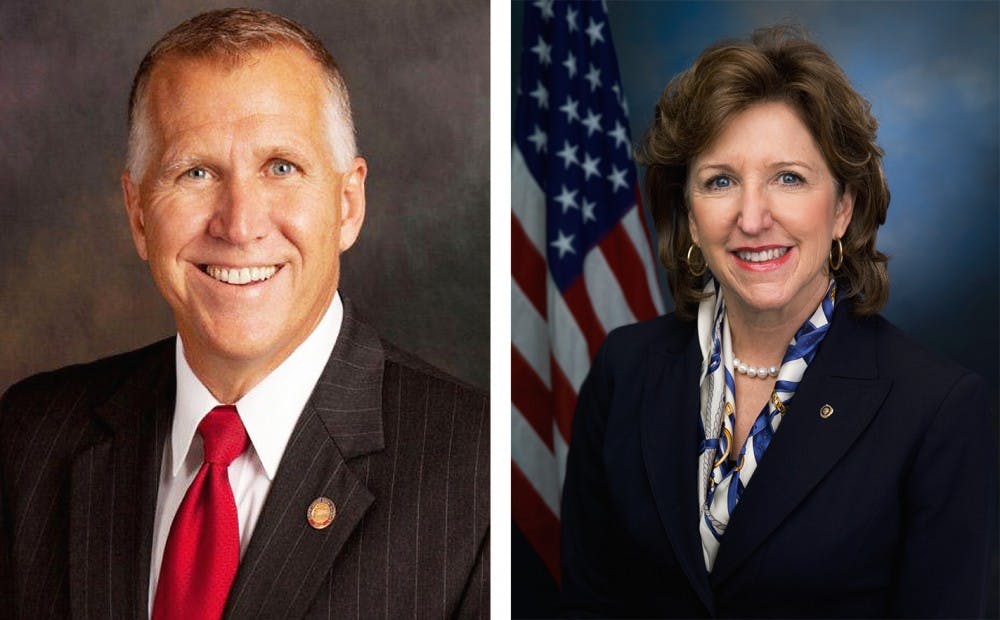Foreign affairs have taken center stage in North Carolina’s highly contentious U.S. Senate race—a shift from the social concerns that typically dominate senatorial elections.
In an Elon University poll released last month, voters overwhelmingly answered that the most important issue in the United States is related to international affairs or national defense. This is the first time since 2007 that foreign affairs was found to be the top issue for North Carolinians.
This response, however, was more prevalent among supporters of Republican Senate candidate and speaker of the North Carolina House of Representatives Thom Tillis. U.S. Democratic Senator Kay Hagan supporters still largely saw education as the most pressing issue.
"It's pretty unusual for foreign policy to matter in non-presidential races—that's except for the very small number of high-profile people," said John Aldrich, Pfizer-Pratt University Professor of Political Science.
Last week, Tillis released two campaign ads attacking Hagan on her decisions concerning foreign policy crises in the Middle East.
The ads primarily highlight Hagan's record of consistently voting with the Democratic party and failing to take action against ISIS as it continues to gain more power. The advertisements have brought foreign policy into the spotlight as a campaign issue, and have come at the same time as a shift in North Carolinians' issue priorities as well. International politics are hardly ever hotly contested in domestic campaigns, so this North Carolina race makes a notable exception, Aldrich added.
"Most senatorial races don't, and hardly any congressional races, so it's pretty much absent until there happens to be a crisis," he said.
Tillis' campaign ads do cater to a specific crisis, as they revolve around the current situation in the Middle East rather than around long-term foreign policy strategies. This kind of discussion has also not expanded substantially into any other senatorial race in the United States this year.
Advertisement talking points
"While ISIS grew, Obama kept waiting, and Kay Hagan kept quiet," claims one of the Tillis ads. It also asserts that Hagan missed half of the hearings in the Armed Services Committee.
The other advertisement features the mother of a marine, herself a military veteran, who laments to the audience that President Barack Obama's inability to resist the expansion of ISIS—and Hagan's unwillingness to speak out against him—has endangered the lives of American soldiers.
Hagan has responded to the ads by emphasizing her belief in taking decisive action against ISIS, including initiating targeted air strikes to destroy their training camps and command centers.
Chris Hayden, Hagan's campaign press secretary, said that Tillis has been hesitant on issues of instability in Iraq and Syria.
"Speaker Tillis has said himself that he doesn’t know what we should do. He has no position," Hayden said. "He has been completely indecisive and flailing at this. These attacks on Kay are really just desperate attacks to distract from his own record."
North Carolina has a strong tradition of placing emphasis on supporting combat troops. Fort Bragg in Fayetteville, N.C. is the largest U.S. Army base in terms of population, serving 52,280 active duty soldiers and housing nearly 240,000 total residents. Additionally, all members of Congress who have held Senator Hagan's current seat since 1973 have been members of a committee dealing with international relations, either in the Armed Services Committee or in the Foreign Relations Committee.
Foreign policy was also a major issue in a North Carolina Senate race since 1984, when incumbent Senator Jesse Helms was accused by opponent Jim Hunt of not sufficiently supporting the Israeli state. Helms went on to win re-election.
Waiting for Election Day
Regardless of the issues at stake, Aldrich said, the state's population remains generally divided over who to vote for.
"Very few people are very excited about either candidate, but don't find the candidates unacceptable either," Aldrich said. "Neither campaign has caught fire, and neither campaign is drowning."
This trend goes beyond the 2014 Senate race. North Carolina has one Democratic senator and one Republican senator. Obama won the state in 2008 by a margin of 14,177 votes, but lost its 15 electoral votes to former Massachusetts Governor Mitt Romney in 2012.
"Nothing is happening that could make a difference, and it's just not exciting the electorate to even know it's so close," Aldrich said.
Aldrich said that the foreign policy element will not be decisive on Election Day. Instead, he expects people to make decisions more about the people and the political climate rather than a single issue.
"[Voters] are going to explicitly say, 'What is it that I like about Hagan? What is it that I like about Tillis?'" he explained. "In the background will be what they think about Obama and what they think about the world today."
It is common for incumbents to be victorious when a race is too close to call, but it is unclear who will take the lead in the time leading up to Election Day.
"If there's no powerful push one way or the other, which seems like the case, you tend to go back to the incumbent," Aldrich said. "Who can get the supporters turned out is something we can't judge at this point, and that's going to really make the difference."
Hagan and Tillis are scheduled to face each other in debates twice this week.
Get The Chronicle straight to your inbox
Signup for our weekly newsletter. Cancel at any time.

